- Home
- L. M. Montgomery
The Story Girl Page 8
The Story Girl Read online
Page 8
“I didn’t,” retorted Felicity indignantly. “Look how Aunt Olivia’s hens laid, too, and she fed them herself just the same as usual.”
“Never mind,” said Cecily, “we have all got something to give. If you were like poor Sara Ray, and hadn’t been able to collect anything you might feel bad.”
But Sara Ray had something to give. She came up the hill after tea, all radiant. When Sara Ray smiled—and she did not waste her smiles—she was rather pretty in a plaintive, apologetic way. A dimple or two came into sight, and she had very nice teeth—small and white, like the traditional row of pearls.
“Oh, just look,” she said. “Here are three dollars—and I’m going to give it all to the library fund. I had a letter to-day from Uncle Arthur in Winnipeg, and he sent me three dollars. He said I was to use it any way I liked, so ma couldn’t refuse to let me give it to the fund. She thinks it’s an awful waste, but she always goes by what Uncle Arthur says. Oh, I’ve prayed so hard that some money might come some way, and now it has. See what praying does!”
I was very much afraid that we did not rejoice quite as unselfishly in Sara’s good fortune as we should have done. We had earned our contributions by the sweat of our brow, or by the scarcely less disagreeable method of “begging.” And Sara’s had as good as descended upon her out of the skies, as much like a miracle as anything you could imagine.
“She prayed for it, you know,” said Felix, after Sara had gone home.
“That’s too easy a way of earning money,” grumbled Peter resentfully. “If the rest of us had just set down and done nothing, only prayed, how much do you s’pose we’d have? It don’t seem fair to me.”
“Oh, well, it’s different with Sara,” said Dan. “We could earn money and she couldn’t. You see? But come on down to the orchard. The Story Girl had a letter from her father to-day and she’s going to read it to us.”
We went promptly. A letter from the Story Girl’s father was always an event; and to hear her read it was almost as good as hearing her tell a story.
Before coming to Carlisle, Uncle Blair Stanley had been a mere name to us. Now he was a personality. His letters to the Story Girl, the pictures and sketches he sent her, her adoring and frequent mention of him, all combined to make him very real to us.
We felt then, what we did not understand till later years, that our grown-up relatives did not altogether admire or approve of Uncle Blair. He belonged to a different world from theirs. They had never known him very intimately or understood him. I realize now that Uncle Blair was a bit of a Bohemian—a respectable sort of tramp. Had he been a poor man he might have been a more successful artist. But he had a small fortune of his own and, lacking the spur of necessity, or of disquieting ambition, he remained little more than a clever amateur. Once in a while he painted a picture which showed what he could do; but for the rest, he was satisfied to wander over the world, light-hearted and content. We knew that the Story Girl was thought to resemble him strongly in appearance and temperament, but she had far more fire and intensity and strength of will—her inheritance from King and Ward. She would never be satisfied as a dabbler; whatever her future career should be, into it she would throw all her powers of mind and heart and soul.
But Uncle Blair could do at least one thing surpassingly well. He could write letters. Such letters! By contrast, Felix and I were secretly ashamed of father’s epistles. Father could talk well but, as Felix said, he couldn’t write worth a cent. The letters we had received from him since his arrival in Rio de Janeiro were mere scrawls, telling us to be good boys and not trouble Aunt Janet, incidentally adding that he was well and lonesome. Felix and I were always glad to get his letters, but we never read them aloud to an admiring circle in the orchard.
Uncle Blair was spending the summer in Switzerland; and the letter the Story Girl read to us, among the fair, frail White Ladies of the Walk, where the west wind came now with a sigh, and again with a rush, and then brushed our faces as softly as the down of a thistle, was full of the glamour of mountain-rimmed lakes, and purple chalets, and “snowy summits old in story.” We climbed Mount Blanc, and saw the Jungfrau soaring into cloudland, and walked among the gloomy pillars of Bonnivard’s prison. Finally, the Story Girl told us the tale of the Prisoner of Chillon, in words that were Byron’s, but in a voice that was all her own.
“It must be just splendid to go to Europe,” sighed Cecily longingly.
“I am going some day,” said the Story Girl airily.
We looked at her with a slightly incredulous awe. To us, in those years, Europe seemed almost as remote and unreachable as the moon. It was hard to believe that one of us should ever go there. But Aunt Julia had gone—and she had been brought up in Carlisle on this very farm. So it was possible that the Story Girl might go too.
“What will you do there?” asked Peter practically.
“I shall learn how to tell stories to all the world,” said the Story Girl dreamily.
It was a lovely, golden-brown evening; the orchard, and the farm-lands beyond, were full of ruby lights and kissing shadows. Over in the east, above the Awkward Man’s house, the Wedding Veil of the Proud Princess floated across the sky, presently turning as rosy as if bedewed with her heart’s blood. We sat there and talked until the first star lighted a white taper over the beech hill.
Then I remembered that I had forgotten to take my dose of magic seed, and I hastened to do it, although I was beginning to lose faith in it. I had not grown a single bit, by the merciless testimony of the hall door.
I took the box of seed out of my trunk in the twilit room and swallowed the decreed pinch. As I did so, Dan’s voice rang out behind me.
“Beverley King, what have you got there?”
I thrust the box hastily into my trunk and confronted Dan.
“None of your business,” I said defiantly.
“Yes, ’tis.” Dan was too much in earnest to resent my blunt speech. “Look here, Bev, is that magic seed? And did you get it from Billy Robinson?”
Dan and I looked at each other, suspicion dawning in our eyes.
“What do you know about Billy Robinson and his magic seed?” I demanded.
“Just this. I bought a box from him for—for—something. He said he wasn’t going to sell any of it to anybody else. Did he sell any to you?”
“Yes, he did,” I said in disgust—for I was beginning to understand that Billy and his magic seed were arrant frauds.
“What for? Your mouth is a decent size,” said Dan.
“Mouth? It had nothing to do with my mouth! He said it would make me grow tail. And it hasn’t—not an inch! I don’t see what you wanted it for! You are tall enough.”
“I got it for my mouth,” said Dan with a shamefaced grin. “The girls in school laugh at it so. Kate Marr says it’s like a gash in a pie. Billy said that seed would shrink it for sure.”
Well, there is was! Billy had deceived us both. Nor were we the only victims. We did not find the whole story out at once. Indeed, the summer was almost over before, in one way or another, the full measure of that shameless Billy Robinson’s iniquity was revealed to us. But I shall anticipate the successive relations in this chapter. Every pupil of Carlisle school, so it eventually appeared, had bought magic seed, under solemn promise of secrecy. Felix had believed blissfully that it would make him thin. Cecily’s hair was to become naturally curly, and Sara Ray was not to be afraid of Peg Bowen any more. It was to make Felicity as clever as the Story Girl and it was to make the Story Girl as good a cook as Felicity. What Peter had bought magic seed for remained a secret longer than any of the others. Finally—it was the night before what we expected would be the Judgment Day—he confessed to me that he had taken it to make Felicity fond of him. Skilfully indeed had that astute Billy played on our respective weaknesses.
The keenest edge to our humiliation was given by the discovery that the magic seed was nothing more or less than caraway, which grew in abundance at Billy Robinson’s uncle’s in Markdale. Peg Bowen had had n
othing to do with it.
Well, we had all been badly hoaxed. But we did not trumpet our wrongs abroad. We did not even call Billy to account. We thought that least said was soonest mended in such a matter. We went very softly indeed, lest the grown-ups, especially that terrible Uncle Roger, should hear of it.
“We should have known better to trust Billy Robinson,” said Felicity, summing up the case one evening when all had been made known. “After all, what could you expect from a pig but a grunt?”
We were not surprised to find that Billy Robinson’s contribution to the library fund was the largest handed in by any of the scholars. Cecily said she didn’t envy him his conscience. But I am afraid she measured his conscience by her own. I doubt very much if Billy’s troubled him at all.
X
A Daughter of Eve
“I hate the thought of growing up,” said the Story Girl reflectively, “because I can never go barefooted then, and nobody will ever see what beautiful feet I have.”
She was sitting, in the July sunlight, on the ledge of the open hayloft window in Uncle Roger’s big barn; and the bare feet below her print skirt were beautiful. They were slender and shapely and satin smooth, with arched insteps, the daintiest of toes, and nails like pink shells.
We were all in the hayloft. The Story Girl had been telling us a tale
“Of old, unhappy, far-off things,
And battles long ago.”
Felicity and Cecily were curled up in a corner, and we boys sprawled idly on the fragrant, sun-warm heaps. We had “stowed” the hay in the loft that morning for Uncle Roger, so we felt that we had earned the right to loll on our sweet-smelling couch. Haylofts are delicious places, with just enough of shadow and soft, uncertain noises to give an agreeable tang of mystery. The swallows flew in and out of their nests above our heads, and wherever a sunbeam fell through a chink the air swarmed with golden dust. Outside of the loft was a vast, sunshiny gulf of blue sky and mellow air, wherein floated argosies of fluffy cloud, and airy tops of maple and spruce.
Pat was with us, of course, prowling about stealthily, or making frantic, bootless leaps at the swallows. A cat in a hayloft is a beautiful example of the eternal fitness of things. We had not heard of this fitness then, but we all felt that Paddy was in his own place in a hayloft.
“I think it is very vain to talk about anything you have your self being beautiful,” remarked Felicity.
“I am not a bit vain,” said the Story Girl, with entire truthfulness. “It is not vanity to know your own good points. It would just be stupidity if you didn’t. It’s only vanity when you get puffed up about them. I am not a bit pretty. My only good points are my hair and eyes and feet. So I think it’s real mean that one of them has to be covered up the most of the time. I’m always glad when it gets warm enough to go barefooted. But, when I grow up they’ll have to be covered all the time. It is mean.”
“You’ll have to put your shoes and stockings on when you go to the magic lantern show to-night,” said Felicity in a tone of satisfaction.
“I don’t know that. I’m thinking of going barefooted.”
“Oh, you wouldn’t! Sara Stanley, you’re not in earnest!” exclaimed Felicity, her blue eyes filling with horror.
The Story Girl winked with the side of her face next to Felix and me, but the side next the girls changed not a muscle. She dearly loved to “take a rise” out of Felicity now and then.
“Indeed, I would if I just made up my mind to. Why not? Why not bare feet—if they’re clean—as well as bare hands and face?”
“Oh, you wouldn’t! It would be such a disgrace!” said poor Felicity in real distress.
“We went to school barefooted all June,” argued that wicked Story Girl. “What is the difference between going to the schoolhouse barefooted in the daytime and going in the evening?”
“Oh, there’s every difference. I can’t just explain it—but every one knows there is a difference. You know it yourself. Oh, please, don’t do such a thing, Sara.”
“Well, I won’t, just to oblige you,” said the Story Girl, who would have died the death before she would have gone to a “public meeting” barefooted.
We were all rather excited over the magic lantern show which an itinerant lecturer was to give in the schoolhouse that evening. Even Felix and I, who had seen such shows galore, were interested, and the rest were quite wild. There had never been such a thing in Carlisle before. We were all going, Peter included. Peter went everywhere with us now. He was a regular attendant at church and Sunday School, where his behaviour was as irreproachable as if he had been “raised” in the caste of Vere de Vere. It was a feather in the Story Girl’s cap, for she took all the credit of having started Peter on the right road. Felicity was resigned, although the fatal patch on Peter’s best trousers was still an eyesore to her. She declared she never got any good of the singing, because Peter stood up then and every one could see the patch. Mrs. James Clark, whose pew was behind ours, never took her eye off it—or so Felicity averred.
But Peter’s stockings were always darned. Aunt Olivia had seen to that, ever since she heard of Peter’s singular device regarding them on his first Sunday. She had also given Peter a Bible, of which he was so proud that he hated to use it lest he should soil it.
“I think I’ll wrap it up and keep it in my box,” he said. “I’ve an old Bible of Aunt Jane’s at home I can use. I s’pose it’s just the same, even if it is old, isn’t it?”
“Oh, yes,” Cecily had assured him. “The Bible is always the same.”
“I thought maybe they’d got some new improvements on it since Aunt Jane’s day,” said Peter, relieved.
“Sara Ray is coming along the lane, and she’s crying,” announced Dan, who was peering out of a knot-hole on the opposite side of the loft.
“Sara Ray is crying half her time,” said Cecily impatiently. “I’m sure she cries a quartful of tears a month. There are times when you can’t help crying. But I hide then. Sara just goes and cries in public.”
The lachrymose Sara presently joined us and we discovered the cause of her tears to be the doleful fact that her mother had forbidden her to go to the magic lantern show that night. We all showed the sympathy we felt.
“She said yesterday you could go,” said the Story Girl indignantly. “Why has she changed her mind?”
“Because of measles in Markdale,” sobbed Sara. “She says Markdale is full of them, and there’ll be sure to be some of the Markdale people at the show. So I’m not to go. And I’ve never seen a magic lantern—I’ve never seen anything.”
“I don’t believe there’s any danger of catching measles,” said Felicity. “If there was we wouldn’t be allowed to go.”
“I wish I could get the measles,” said Sara defiantly. “Maybe I’d be of some importance to ma then.”
“Suppose Cecily goes down with you and coaxes your mother,” suggested the Story Girl. “Perhaps she’d let you go then. She likes Cecily. She doesn’t like either Felicity or me, so it would only make matters worse for us to try.”
“Ma’s gone to town—pa and her went this afternoon—and they’re not coming back till to-morrow. There’s nobody home but Judy Pineau and me.”
“Then,” said the Story Girl, “why don’t you just go to the show anyhow? Your mother won’t ever know, if you coax Judy to hold her tongue.”
“Oh, but that’s wrong,” said Felicity. “You shouldn’t put Sara up to disobeying her mother.”
Now, Felicity for once was undoubtedly right. The Story Girl’s suggestion was wrong; and if it had been Cecily who protested, the Story Girl would probably have listened to her, and proceeded no further in the matter. But Felicity was one of those unfortunate people whose protests against wrong-doing serve only to drive the wrong-doer further on her sinful way.
The Story Girl resented Felicity’s superior tone, and proceeded to tempt Sara in right good earnest. The rest of us held our tongues. It was, we told ourselves, Sara’s own lookout.
“I have a good mind to do it,” said Sara. “But I can’t get my good clothes; they’re in the spare room, and ma locked the door, for fear somebody would get at the fruit cake. I haven’t a single thing to wear, except my school gingham.”
“Well, that’s new and pretty,” said the Story Girl. “We’ll lend you some things. You can have my lace collar. That’ll make the gingham quite elegant. And Cecily will lend you her second best hat.”
“But I’ve no shoes or stockings. They’re locked up too.”
“You can have a pair of mine,” said Felicity, who probably thought that since Sara was certain to yield to temptation, she might as well be garbed decently for her transgression.
Sara did yield. When the Story Girl’s voice entreated it was not easy to resist its temptation, even if you wanted to. That evening, when we started for the schoolhouse, Sara Ray was among us, decked out in borrowed plumes.
“Suppose she does catch the measles?” Felicity said aside.
“I don’t believe there’ll be anybody there from Markdale. The lecturer is going to Markdale next week. They’ll wait for that,” said the Story Girl airily.
It was a cool, dewy evening, and we walked down the long, red hill in the highest of spirits. Over a valley filled with beech and spruce was a sunset afterglow—creamy yellow and a hue that was not so much red as the dream of red, with a young moon swung low in it. The air was sweet with the breath of mown hayfields where swaths of clover had been steeping in the sun. Wild roses grew pinkly along the fences, and the roadsides were star-dusted with buttercups.
Those of us who had nothing the matter with our consciences enjoyed our walk to the little whitewashed schoolhouse in the valley. Felicity and Cecily were void of offence towards all men. The Story Girl walked uprightly like an incarnate flame in her crimson silk. Her pretty feet were hidden in the tan-coloured, buttoned Paris boots wich were the secret envy of every school girl in Carlisle.
But Sara Ray was not happy. Her face was so melancholy that the Story Girl lost patience with her. The Story Girl herself was not altogether at ease. Probably her own conscience was troubling her. But admit it she would not.

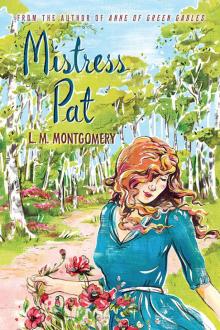 Mistress Pat
Mistress Pat A Tangled Web
A Tangled Web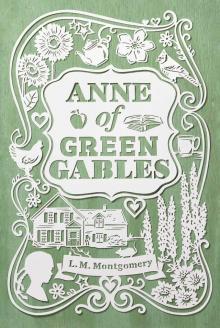 Anne of Green Gables
Anne of Green Gables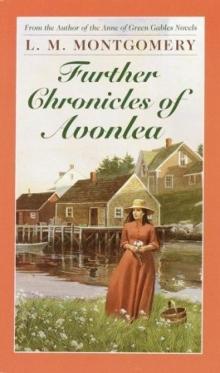 Further Chronicles of Avonlea
Further Chronicles of Avonlea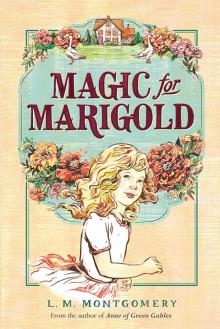 Magic for Marigold
Magic for Marigold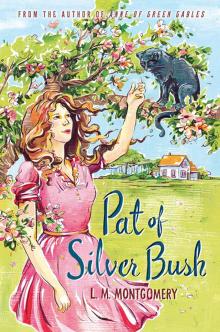 Pat of Silver Bush
Pat of Silver Bush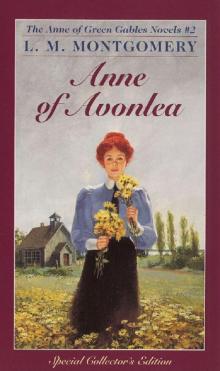 Anne of Avonlea
Anne of Avonlea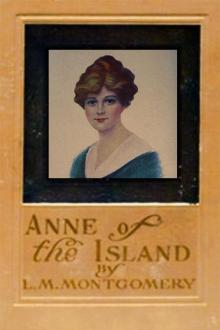 Anne of the Island
Anne of the Island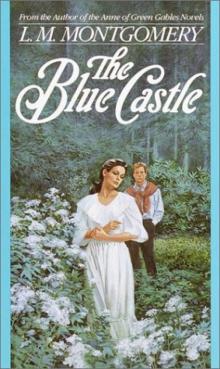 The Blue Castle
The Blue Castle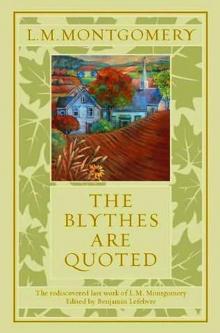 The Blythes Are Quoted
The Blythes Are Quoted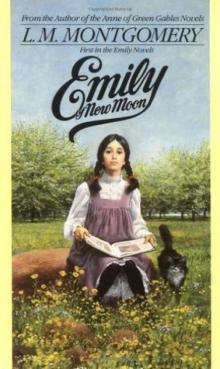 Emily of New Moon
Emily of New Moon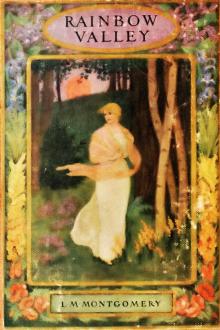 Rainbow Valley
Rainbow Valley Rilla of Ingleside
Rilla of Ingleside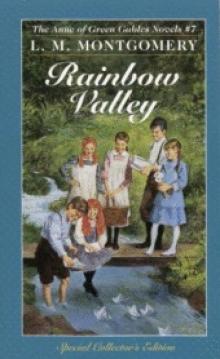 07 - Rainbow Valley
07 - Rainbow Valley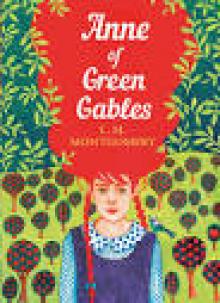 Anne of Green Gables (Penguin)
Anne of Green Gables (Penguin) Emily Climbs
Emily Climbs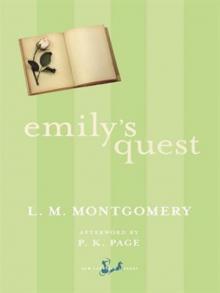 Emily's Quest
Emily's Quest A Name for Herself
A Name for Herself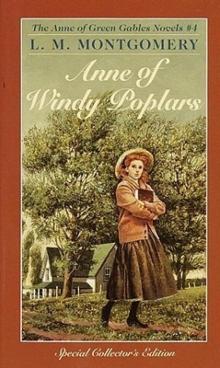 Anne of Windy Poplars
Anne of Windy Poplars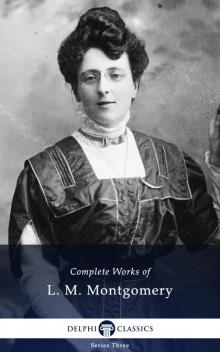 The Complete Works of L M Montgomery
The Complete Works of L M Montgomery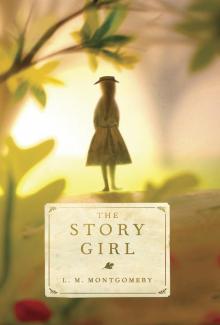 The Story Girl
The Story Girl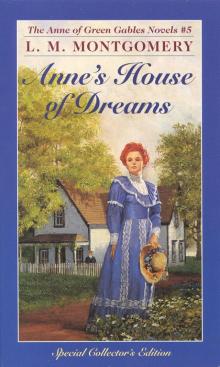 Anne's House of Dreams
Anne's House of Dreams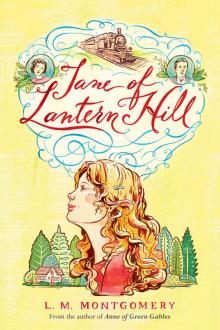 Jane of Lantern Hill
Jane of Lantern Hill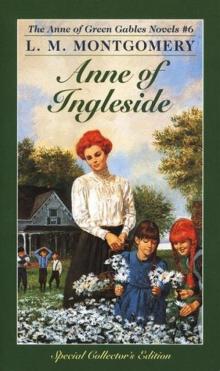 Anne of Ingleside
Anne of Ingleside